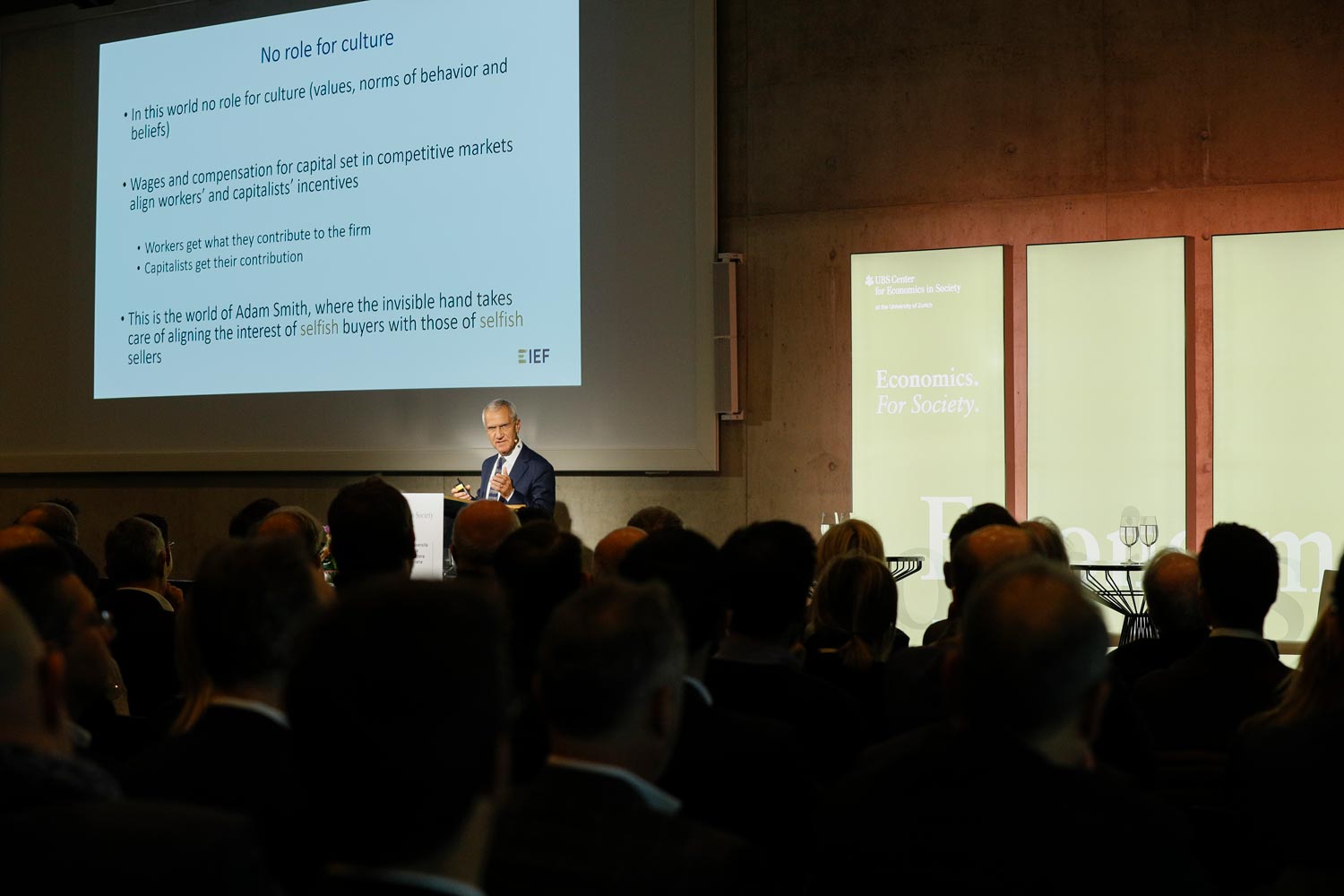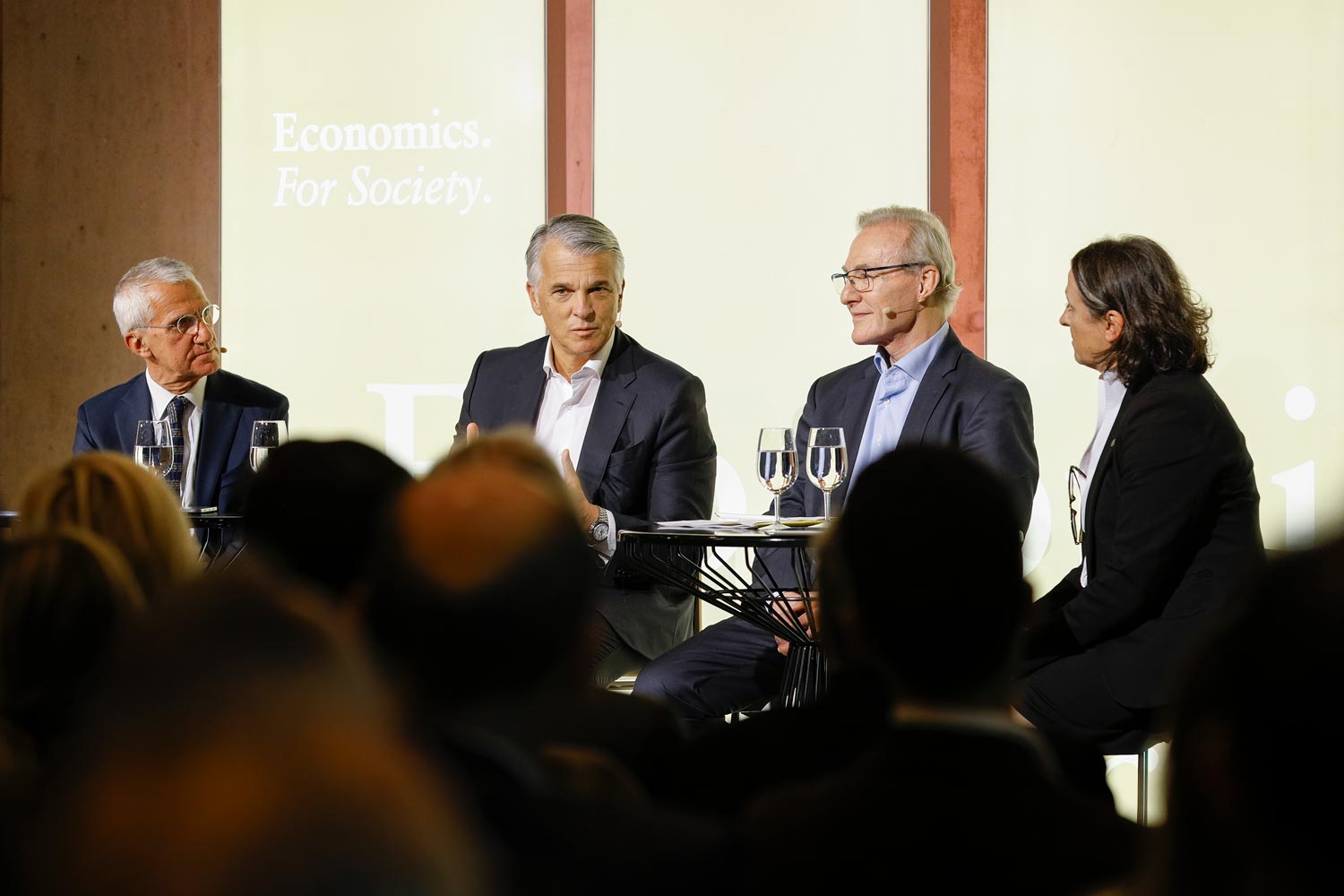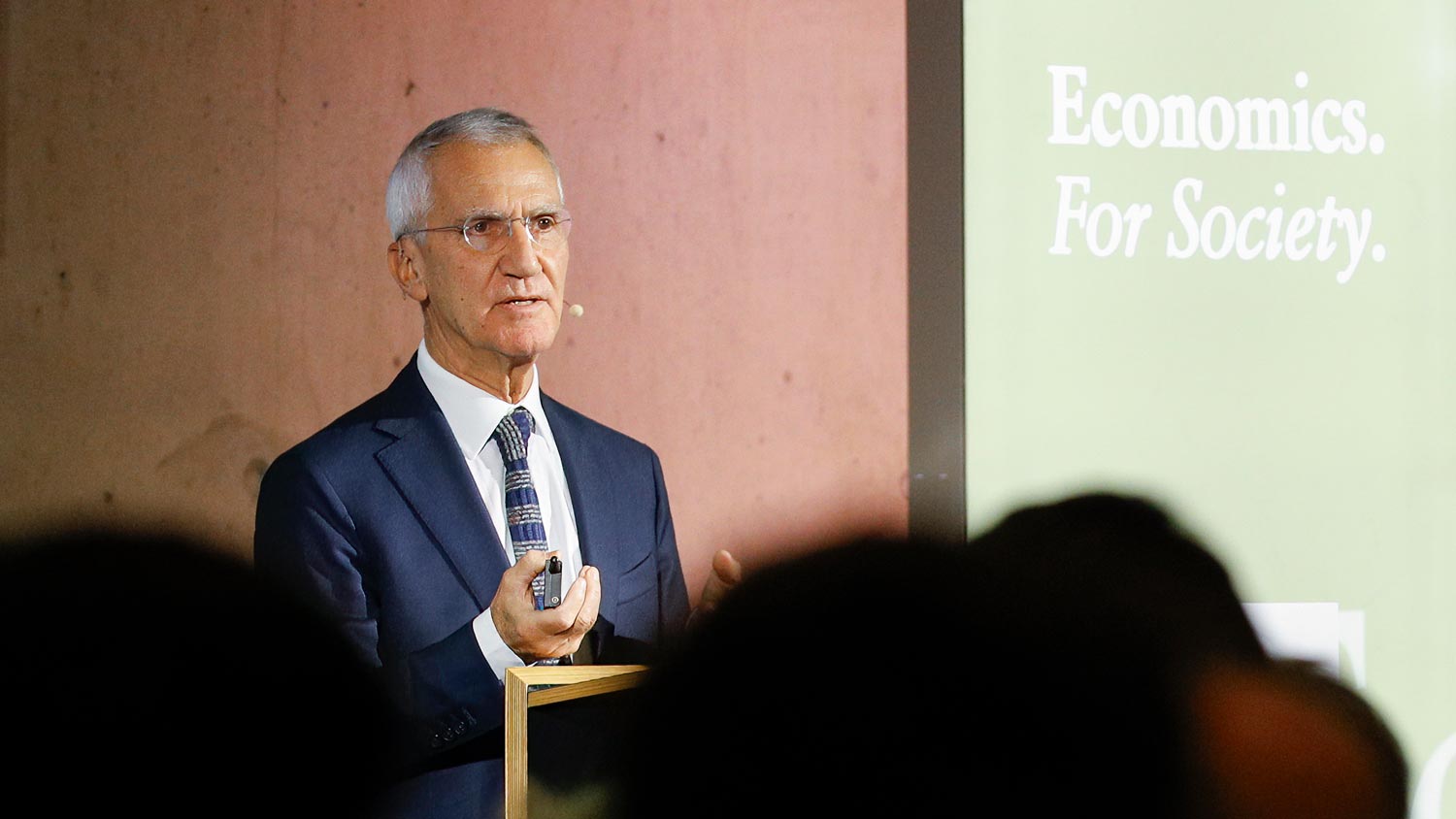Jump directly to
Unlocking the culture code
On November 14, 2024, the UBS Center and Università della Svizzera italiana gathered a significant audience in a joint event to explore the critical role corporate culture plays in both the triumphs and failures of businesses today. In his keynote lecture, Prof. Luigi Guiso delved into the evolving understanding of corporate culture in economic research and business. The panelists concluded that corporate culture is a living, dynamic construct shaped by leadership, values, and societal influences.
Maura Wyler (Text) & Studio Daulte (Images)
Keynote lecture: The value of corporate culture
In his keynote lecture, Prof. Luigi Guiso delved into the evolving understanding of corporate culture in economic research and business. He highlighted how, historically, cultural factors were largely dismissed in favor of economic models shaped by Adam Smith’s worldview, where competitive markets aligned incentives and governed outcomes. Yet, companies consistently proclaim their values, raising the question of whether these are mere tools for profit maximization or if they hold deeper significance. Guiso emphasized that values—defined as principles or standards of behavior—are a fundamental component of corporate culture, which he categorized into functional, ideological, and moral values.
Guiso presented compelling research findings on the impact of values on corporate performance. He demonstrated that while proclaimed values have no measurable effect on performance, managerial integrity strongly correlates with success. Companies where employees perceive alignment between management’s actions and stated values enjoy higher stock returns and growth opportunities. Moreover, firms practicing value-based leadership—where leaders and employees share aligned values—exhibit resilience during crises, reduced conflicts, and lower turnover rates, fostering a healthier organizational climate.
Guiso argued that corporate values cannot be reduced to functional assets alone. Companies are embedded in societal culture, and stakeholder values—whether ideological or moral—shape corporate behavior. For example, firms in the U.S. are increasingly polarized along political lines, with leadership changes often penalized by markets if ideological homogeneity is perceived as detrimental. Workers, too, prioritize values, showing a preference for ESG-driven companies even at lower wages. Guiso concluded by underscoring the dual challenge for firms: navigating polarized societal values while balancing profitability and stakeholder expectations, a tradeoff critical to societal and corporate success alike.
Unlocking the Culture Code: Insights from the Panel Discussion
The panel discussion brought together Luigi Guiso, Sergio P. Ermotti (UBS), and Ernst Fehr (University of Zurich), with USI Rector Luisa Lambertini as moderator. The dialogue explored how leadership, norms, and values intersect to shape corporate culture, particularly in times of organizational integration, and evolving work environments.
Sergio P. Ermotti reflected on his leadership journey at UBS following the financial crisis, explaining how the focus was not on redefining the bank’s culture but on restoring and strengthening its core principles. Through initiatives such as linking the UBS logo’s three keys to pillars of performance, client focus, and behavior, Ermotti emphasized the importance of clarity and alignment in cultivating accountability and collaboration. These values became essential during the merger with Credit Suisse, where Ermotti prioritized pragmatic decision-making, creating a sense of shared purpose among employees, and achieving swift progress.
Building on this, Luigi Guiso addressed the importance of aligning proclaimed values with actual behaviors. Highlighting examples like Enron, he underscored the dangers of inconsistency and pointed out that understanding employee perceptions is key to assessing cultural integrity. “Workers know a lot about the culture inside their company. Measuring their perceptions can offer a reliable picture of corporate values,” Guiso explained. He argued that credible and committed leadership is essential for addressing cultural gaps and transforming toxic work environments, as trust in leadership directly impacts an organization’s ability to attract and retain talent.
Ernst Fehr expanded on the role of behavioral norms in driving organizational outcomes, emphasizing how the absence of meritocracy or the presence of disruptive individuals can erode a culture. “A single troublemaker in a team of 20 can create a toxic atmosphere,” Fehr observed, stressing that such individuals not only affect morale but also destabilize the broader behavioral standards that hold a team together. He advocated for creating a culture where "speaking up" becomes a shared expectation, not just an option. Establishing this feedback culture involves making constructive communication a social norm, where employees feel both safe and obligated to address behaviors that deviate from agreed-upon standards. Fehr explained that embedding such norms requires leaders to take proactive steps, such as fostering open communication channels and modeling feedback-seeking behavior themselves. By treating feedback as a shared responsibility and a cornerstone of organizational interaction, employees are encouraged to see it as a positive act of collaboration rather than criticism. When this expectation is reinforced consistently, it aligns individual behavior with collective goals, building trust, fairness, and cohesion across teams.
The panelists concluded that corporate culture is a living, dynamic construct shaped by leadership, values, and societal influences. Effective leaders must navigate these complexities with authenticity, adaptability, and a commitment to fostering environments that empower individuals while aligning them with organizational goals.
On November 14, 2024, the UBS Center and Università della Svizzera italiana gathered a significant audience in a joint event to explore the critical role corporate culture plays in both the triumphs and failures of businesses today. In his keynote lecture, Prof. Luigi Guiso delved into the evolving understanding of corporate culture in economic research and business. The panelists concluded that corporate culture is a living, dynamic construct shaped by leadership, values, and societal influences.
Maura Wyler (Text) & Studio Daulte (Images)
Keynote lecture: The value of corporate culture
In his keynote lecture, Prof. Luigi Guiso delved into the evolving understanding of corporate culture in economic research and business. He highlighted how, historically, cultural factors were largely dismissed in favor of economic models shaped by Adam Smith’s worldview, where competitive markets aligned incentives and governed outcomes. Yet, companies consistently proclaim their values, raising the question of whether these are mere tools for profit maximization or if they hold deeper significance. Guiso emphasized that values—defined as principles or standards of behavior—are a fundamental component of corporate culture, which he categorized into functional, ideological, and moral values.


Press
For many companies, corporate culture is a cornerstone of their business that influences the performance and, not least, determines the value of the company. But why is it (still) so important and, above all, how great is the risk of it becoming an end in itself? Get answers from the interview with Prof. Luigi Guiso from the Einaudi Institute for Economics and Finance who was the keynote speaker at our Opinion event in Lugano.
For many companies, corporate culture is a cornerstone of their business that influences the performance and, not least, determines the value of the company. But why is it (still) so important and, above all, how great is the risk of it becoming an end in itself? Get answers from the interview with Prof. Luigi Guiso from the Einaudi Institute for Economics and Finance who was the keynote speaker at our Opinion event in Lugano.
